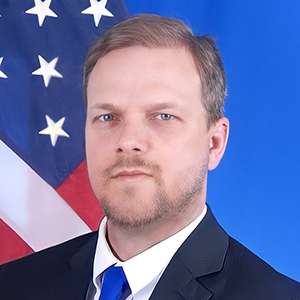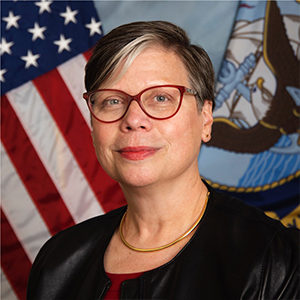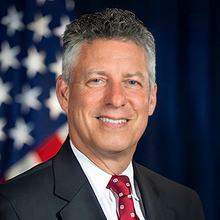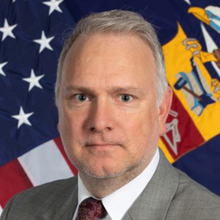CyberScape: ID
Faced with an executive order to improve cybersecurity, agencies are introducing processes to protect their systems and networks. Amid an evolving technology landscape that incorporates more virtual and cloud environments, application development and data access off premises, securing these systems to prevent unwanted breaches is mandatory. Leaders discuss strategies in zero trust, identity access management and more to bring cybersecurity approaches to the next level.

Speakers / Panelists
-
 Amy Kluber Editor-in-Chief GovCIO Media & Research
Amy Kluber Editor-in-Chief GovCIO Media & Research
On the heels of President Joe Biden’s Executive Order on Improving the Nation’s Cybersecurity, federal agencies are working toward implementing the order’s mandates, like zero trust, in practical, actionable steps.
Speakers / Panelists
-
 Eric Mill Senior Advisor on Technology and Cybersecurity to the Federal CIO OMB
Eric Mill Senior Advisor on Technology and Cybersecurity to the Federal CIO OMB -
 Moderator Amy Kluber Editor-in-Chief GovCIO Media & Research
Moderator Amy Kluber Editor-in-Chief GovCIO Media & Research
Identity, credential and access management solutions are increasingly critical for federal agencies as they move IT operations to cloud environments. Zero trust principles play an important role in the process of granting certain identities access to certain applications within the cloud. Agency leaders talk how zero trust and ICAM solutions are two sides of the key to optimized cloud security.
Speakers / Panelists
-
 Gerald Caron CIO, Office of the Inspector General HHS
Gerald Caron CIO, Office of the Inspector General HHS -
 Angel Phaneuf CISO Army Software Factory
Angel Phaneuf CISO Army Software Factory -
 Jane Rathbun CTO U.S. Navy
Jane Rathbun CTO U.S. Navy -
 Jim Richberg Public Sector CISO and Vice President of Information Security Fortinet Federal
Jim Richberg Public Sector CISO and Vice President of Information Security Fortinet Federal -
 Kate Macri Senior Researcher GovCIO Media & Research
Kate Macri Senior Researcher GovCIO Media & Research
As federal agencies improve cybersecurity in accordance with the White House cyber executive order, cyber leaders must balance security and privacy concerns when rolling out identity access management strategies. Hear from federal agencies about how they’re navigating legal and ethical questions while managing identity data to secure their networks.
Speakers / Panelists
-
 Ken Clark Assistant Director, Information Governance & Privacy ICE
Ken Clark Assistant Director, Information Governance & Privacy ICE -
 Scott Davis Acting CISO CBP
Scott Davis Acting CISO CBP -
 Don Watson CISO USPTO
Don Watson CISO USPTO
Speakers / Panelists
-
 Paul Puckett Director, Enterprise Cloud Management Agency U.S. Army
Paul Puckett Director, Enterprise Cloud Management Agency U.S. Army -
 Moderator Kate Macri Senior Researcher GovCIO Media & Research
Moderator Kate Macri Senior Researcher GovCIO Media & Research
Speakers / Panelists
-
 Gerald Caron CIO, Office of the Inspector General, HHS
Gerald Caron CIO, Office of the Inspector General, HHS -
 Ken Clark Assistant Director, Information Governance & Privacy, ICE
Ken Clark Assistant Director, Information Governance & Privacy, ICE -
 Scott Davis Acting CISO, CBP
Scott Davis Acting CISO, CBP -
 Amy Kluber Editor-in-Chief, GovCIO Media & Research
Amy Kluber Editor-in-Chief, GovCIO Media & Research -
 Kate Macri Senior Researcher, GovCIO Media & Research
Kate Macri Senior Researcher, GovCIO Media & Research -
 Eric Mill Senior Advisor on Technology and Cybersecurity to the Federal CIO, OMB
Eric Mill Senior Advisor on Technology and Cybersecurity to the Federal CIO, OMB -
 Angel Phaneuf CISO, Army Software Factory
Angel Phaneuf CISO, Army Software Factory -
 Paul Puckett Director, Enterprise Cloud Management Agency, U.S. Army
Paul Puckett Director, Enterprise Cloud Management Agency, U.S. Army -
 Jane Rathbun CTO, U.S. Navy
Jane Rathbun CTO, U.S. Navy -
 Jim Richberg Public Sector CISO and Vice President of Information Security, Fortinet Federal
Jim Richberg Public Sector CISO and Vice President of Information Security, Fortinet Federal -
 Don Watson CISO, USPTO
Don Watson CISO, USPTO



